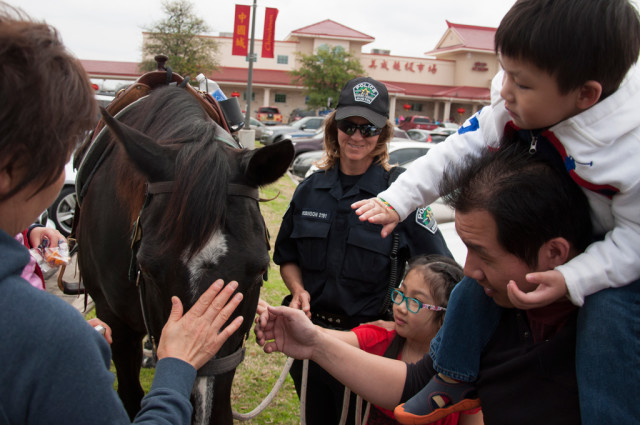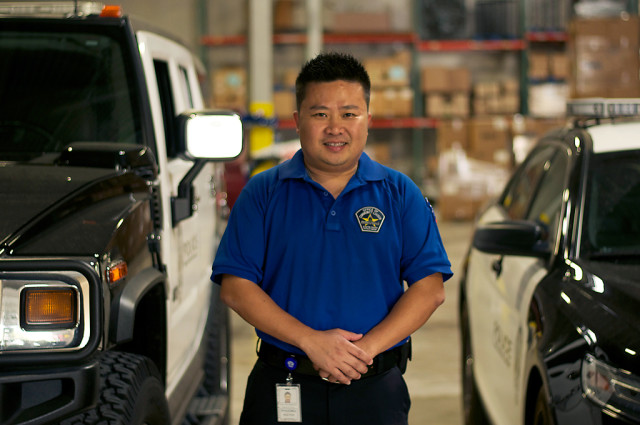Lone Liaison Works to Link Austin Police with Growing Asian Communities

An officer of the Austin Police Department participates in an immigration outreach program at the Chinese New Year celebrations. Photos by Fernanda Del Toro/Reporting Texas
By Gloria Fan
For Reporting Texas
Red and gold flags drifted above the MT Supermarket parking lot in North Austin for the community’s Chinese New Year celebration in February. Among the lion dancers, drum-and-cymbal performers and trinket vendors, the large, heavily Asian crowd encountered a sight many didn’t expect: The Austin Police Department was spread out across the parking lot, conducting its own performances.
Flocks of families gazed at the bomb squad robot, a SWAT van, a patrol boat and two motorcycles, along with K-9 unit dogs and a pair of police horses. Officers stood close by to introduce themselves and answer questions.
Phuong Nguyen, 35, smiled as he took in the scene. He is the community liaison for the department’s Asian Outreach Program, now in its 16th year. This was the third year in a row Nguyen had organized the Chinese New Year activities.
“I want people to see the softer side of the police,” he said. “The Asian community doesn’t see [police officers as] having family and friends. An event like this will help them see … officers smile and laugh as much as we do.”
Nguyen’s family left Vietnam and settled in Austin when he was nine. Growing up, he witnessed friends cave to peer pressure to use drugs and alcohol. Those teenage experiences led him to the police department, which hired him as a 911 operator. In 2013, he became the Asian community liaison.

Phuong Nguyen, community liaison in charge of the Austin Police Department’s Asian Immigration Outreach Program.
To reach out to Asian youths, Nguyen launched a program aimed at developing more student leaders at Lanier High School in North Austin, where the city’s Asian-American population is concentrated. He encourages parents to sign up their kids for Police Activities League (PAL) summer camps, and is in frequent contact with members of Austin’s Asian communities.
While the department praises Nguyen for his efforts, some community leaders would like to see more impact. He works hard and is well-intentioned, the leaders said, but his program has limited financial resources and Nguyen does not speak Asian languages other than Vietnamese.
A bigger problem, according to community leaders, is that the city’s Asian population is growing at a faster rate than the police department is hiring Asian officers.
Asians make up nearly seven percent of the population, according to the most recent Census data. The largest group is South Asian, primarily Indian, followed by Chinese, Vietnamese, Korean, Filipino and Japanese. The city has the highest percentage of Asians in Texas and the tenth-largest Asian population in the country, according to the Greater Austin Asian Chamber of Commerce.
“The general population of Austin doubles every 20 to 25 years. The number of Asians in Austin is doubling every 10 years,” said Ryan Robinson, the city demographer.
As of February, 34 of the police department’s 1,738 officers, or about two percent, were Asian, state records show.
Lt. Gerardo Gonzalez, in charge of recruiting, said the department is working to add Asian officers. The task can be difficult, he said. “Our efforts to recruit Asian officers are definitely there,” Gonzalez said. The recruiting unit “tries to attend three events with the Asian community every year, where we set up a recruiting booth. We’re trying our best to hit all segments of the community and be representative of all of them.”
The Asian American Quality of Life Advisory Commission in Austin urges the department to reach out more to Asian communities.
“Asians relate better on a face-to-face relationship,” said Richard Jung, a member of the commission. “Officers need to know people by first-name basis, and only then people will know to come and ask for help rather than having the police discover the problems themselves.”
Li Li, the president of the Chinese Society in Austin, contacts Nguyen when she needs the police department to be part of a community seminar. She appreciates his prompt response to requests and eagerness to hold events. But she worries that Nguyen might not be able to keep up with her requests in the future because of the population’s rapid growth.
Mike Sheffield, the manager of community liaison for the police department, is aware of such concerns. “Although there is no plan yet to hire another community liaison for the Asian community, I hope that the department will look into hiring one pretty soon,” Sheffield said. “Because in time, Nguyen will not be enough to represent that entire community.”
The Lanier High program is in its pilot year, and Nguyen hopes it helps students stay out of trouble and view police in a positive light. Aimy Tu, a volunteer with the program, called Leaders in Knowledge and Support, or LinKS, said it’s too soon to tell.
“Nguyen only focuses on one high school … and the program does not have some sort of reward to encourage [students] to join,” Tu said. “How can this program help Asian youths if there’s no incentive?” She said some students participate half-heartedly to get credit for being part of an extracurricular activity.
Nguyen believes his efforts are paying off, emphasizing that he pushes for more Asian youth engagement with law enforcement.
“Gang activity and any other bad influences are things that the police department expects. Therefore, to try to prevent that influence [on] youths, it is the program’s goal to talk with and through the community,” he said.
Police officials said there are no Asian gangs in Austin. The department’s gang unit has suspected, however, that gang members come from other states and attend colleges in Austin to recruit new members. “The main technique of operation for Asian gangs is secrecy,” Nguyen said. “Our goal is to prevent youths from making such choices. We do that by educating and mentoring them while they are still young.”
In addition to coordinating LinKS, Nguyen connected with PAL and learned that its summer camp had never had an Asian-American participant. In one year, he and Thuy Nguyen, an Austin public school teacher and a member of the Asian-American Quality of Life Advisory Commission, were able to add 16 Asian-American participants to the camp.
Phuong Nguyen sets his sights high. “I want to educate the future generation about careers and opportunities,” he said, “so they can … become great community leaders.”